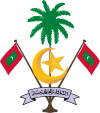| This article is part of a series on the |
| Politics of the Maldives |
|---|
 |
A constitutional referendum was held in the Maldives in August 1953. [1] The proposed amendments would result in the country becoming a sultanate again. This would reverse the outcome of a referendum the previous year, which resulted in the country becoming a republic. The 1953 referendum was held after the new republican government was overthrown after just a few months. [2] The proposals were approved by voters, and Muhammad Fareed Didi was proclaimed as Sultan on 6 March 1954. [2]
